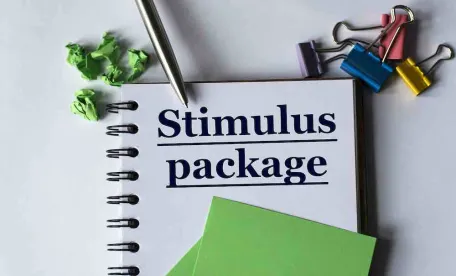The American Rescue Plan Act of 2021 (ARPA), which became law on March 11, 2021, provides a 100 percent subsidy of premiums under the Consolidated Omnibus Budget Reconciliation Act (COBRA) beginning on April 1, 2021, through September 30, 2021, with employers to recoup the missing premiums through Medicare tax credits.
An individual is eligible for the COBRA premium subsidy if he or she lost coverage due to a reduction in hours or an involuntary termination of employment. Employers must treat “assistance-eligible individuals” who have COBRA coverage during the six-month subsidy period as having paid their premiums in full. Note, though, that mere eligibility for other group health plan coverage or Medicare will cut off an individual’s eligibility for the COBRA subsidy. Individuals must self-report their eligibility for other coverage to the COBRA plan and will be subject to a tax penalty for failing to do so.
Note that the subsidy is not limited to involuntary terminations or reductions in hours that occur on or after April 1, 2021. Instead, a second election period provides individuals who were terminated, or had their hours reduced, as far back as late 2019, the chance to retroactively elect fully subsidized COBRA—which would begin on April 1, 2021. Also, a terminated employee who previously elected COBRA coverage and then stopped paying premiums may be eligible to retroactively elect fully subsidized COBRA coverage beginning April 1, 2021, if he or she is still within the initial maximum COBRA period (i.e., 18 months from his or her qualifying event).
Subsidy Basics
The ARPA subsidy comes on the heels of recent U.S. Department of Labor (DOL) and Internal Revenue Service (IRS) guidance extending COBRA election and premium payment deadlines and other benefit plan administration deadlines, for up to one year on a case-by-case basis. Under those deadline extensions, many individuals who had qualifying events including terminations of employment in 2020 could elect COBRA coverage in 2021, but they would have to pay premiums going back to the original qualifying event.
The ARPA subsidy applies only to “involuntary” terminations, adding an important new distinction for COBRA administration. Additionally, the subsidy is limited to people who have had specific qualifying events under existing COBRA law. An individual whose employment was involuntarily terminated for “gross misconduct” would technically not have had a COBRA qualifying event and, therefore, would not be subsidy-eligible. The DOL and IRS may have more to say on this in future guidance.
Former employees who had COBRA coverage in effect on April 1, 2021 will be deemed to have paid their premiums in full from April 1, 2021, until September 30, 2021, (or, if earlier, when their initial maximum COBRA period would end). Former employees, or those who experienced a reduction in hours, who had not elected COBRA, or who had elected but then stopped paying premiums, will have 60 days following issuance of a new COBRA notice (see the “Notice Requirements” section below) to elect to receive the subsidized coverage. It does not appear that this 60-day deadline would be extended under the recent DOL guidance, but future guidance is expected to clarify a number of administrative issues.
For those eligible for the subsidy due to the second election period, the ARPA would not require COBRA coverage to be effective back to the initial qualifying event, as COBRA coverage generally would be. Instead, the individual would only be eligible for COBRA coverage starting on April 1, 2021, and generally continuing until the end of the individual’s original maximum period. The subsidy, however, would end on September 30, 2021, or earlier if the individual became eligible for other group health plan coverage.
The ARPA also permits employers to give assistance-eligible individuals 90 days to switch to another coverage option that is no more expensive than their previous option—for example, switching from a preferred provider organization (PPO) to a health maintenance organization (HMO). The other option must be one that is “also offered to similarly-situated active employees” and cannot be an excepted benefit plan, a qualified small employer health reimbursement arrangement, or a health flexible spending arrangement.
Notice Requirements
The ARPA includes significant changes to the COBRA notice requirements.
First, an assistance eligible individual whose involuntary termination or reduction of hours occurs before April 1, 2021, must be provided with additional information, beyond what would have been in his or her original COBRA election notice, by May 31, 2021. That additional information must include a prominent description of the new subsidy and an explanation of the second election period, which may be provided by amending existing COBRA notices or providing a separate notice. The ARPA directs the DOL to issue a model notice by mid-April.
Similarly, an assistance-eligible individual who becomes eligible to elect COBRA on or after April 1, 2021, must also be provided with the additional information. Employers must follow ordinary COBRA election notice timing rules for these employees.
Individuals who receive the subsidy must be notified of the subsidy’s expiration between 45 and 15 days before it expires. For example, someone eligible to receive the subsidy through September 30, 2021, would have to be notified no earlier than August 16, 2021 and no later than September 15, 2021. The notice must identify the date the subsidy will expire, and must state that the individual may be eligible for continued, but unsubsidized, COBRA coverage, or for other unsubsidized group health plan coverage (such as through an ACA marketplace or Medicaid). No expiration notice is required when subsidy eligibility ends due to the individual’s eligibility for other coverage.
The ARPA requires the DOL, in consultation with the U.S. Department of the Treasury and the U.S. Department of Health and Human Services, to publish a model subsidy expiration notice by late April 2021. The ARPA does not address whether employers must send expiration notices to individuals who are eligible for subsidized COBRA coverage but otherwise have not elected coverage prior to September 15, 2021—the date the COBRA premium subsidy expiration notice would be due. Presumably, the upcoming guidance will address this and other administrative questions.
Medicare Tax Credits
To fund these new obligations for the COBRA premiums not paid by assistance-eligible individuals, employers (or multiemployer plans or insurers, depending on the type of plan) will be eligible for a 100 percent credit against Medicare taxes quarterly. Note that if an employer paid COBRA premiums on behalf of someone who is not an assistance-eligible individual, then no credit will be available.
Some key features of the credit result in enhanced cash flow for employers. First, the credit is refundable so that employers will be eligible for the full value of the credit, even if their Medicare tax obligation is less than the value of the credit. Additionally, this payroll tax credit will be advanceable. Though we are awaiting guidance, other advanceable COVID-19-related credits have permitted employers to reduce tax deposits or use IRS Form 7200 to claim the credit prior to filing the quarterly Form 941 at the end of the quarter. Further Form 941 reporting and reconciliation guidance is expected.
However, there are some limitations in place. Specifically, employers will not be able to claim the COBRA premium credit on amounts for which employee retention credits or Families First Coronavirus Relief Act credits have already been obtained. Additionally, the statute of limitations for assessments on these credits is extended to five years from the traditional three years.






 />i
/>i
